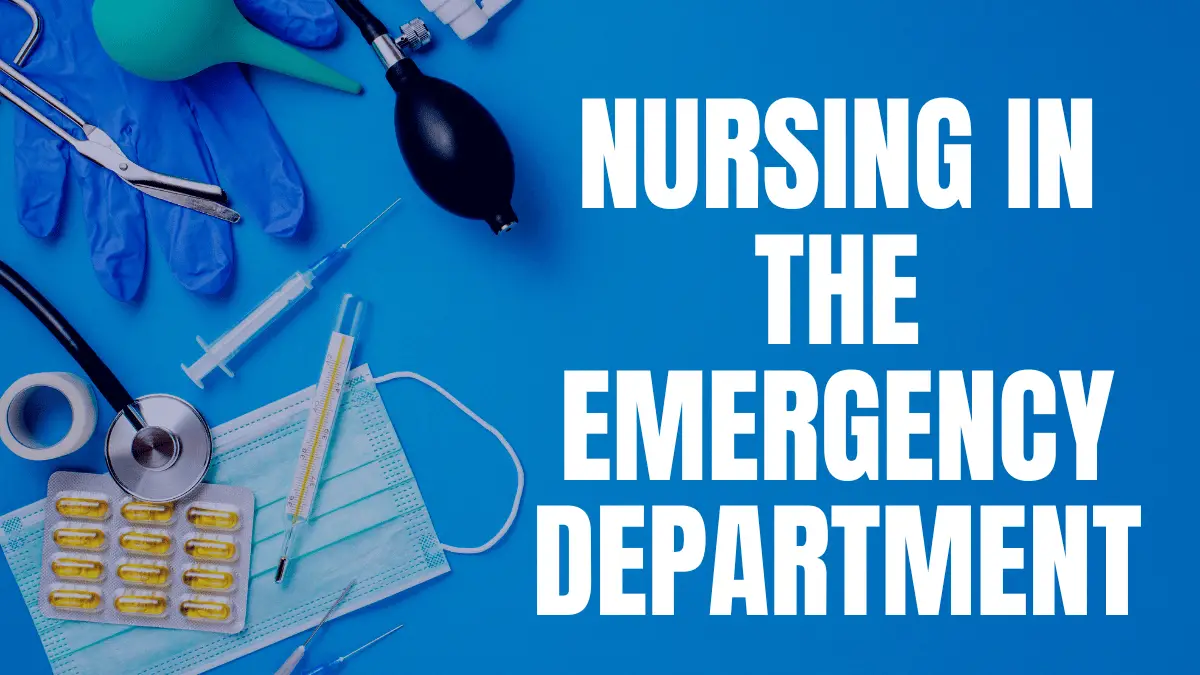Welcome to the heart of healthcare’s frontline – the Emergency Department (ED). For nurses, working in the ED is an exhilarating yet demanding experience, requiring a unique set of skills, adaptability, and resilience. In this comprehensive guide, we’ll delve into the intricacies of nursing in the ED, offering insights, tips, and essential information to help nurses navigate this fast-paced environment with confidence and proficiency.
Understanding the Role of Nurses in the Emergency Department:
In the ED, nurses play a pivotal role in delivering timely and efficient patient care. They are responsible for triaging patients, assessing their conditions, administering treatments, and providing emotional support to patients and their families amidst often chaotic circumstances.
Key Responsibilities of ED Nurses:
- Triage and Assessment: Upon arrival, nurses triage patients based on the severity of their condition, ensuring that those in critical condition receive immediate attention.
- Emergency Interventions: Nurses perform various emergency procedures such as CPR, wound care, and administering medications to stabilize patients.
- Collaborative Care: They work closely with physicians, specialists, and other healthcare professionals to develop and implement comprehensive care plans.
- Patient Advocacy: ED nurses advocate for patients’ needs, ensuring they receive appropriate care and treatment while respecting their rights and preferences.
Table: Common Medical Emergencies Seen in the Emergency Department
| Medical Emergency | Description |
|---|---|
| Myocardial Infarction | Acute chest pain, often radiating to the left arm or jaw, accompanied by sweating and shortness of breath. Immediate intervention is crucial to prevent cardiac damage. |
| Stroke | Sudden onset of neurological deficits such as weakness, slurred speech, and facial drooping. Rapid assessment and administration of thrombolytic therapy can minimize brain damage. |
| Traumatic Injuries | Range from minor cuts and bruises to severe injuries such as fractures, head trauma, and internal bleeding. Prompt assessment, stabilization, and surgical intervention may be required. |
| Respiratory Distress | Manifests as shortness of breath, wheezing, and cyanosis. Common causes include asthma exacerbations, pneumonia, and pulmonary embolism. Prompt oxygen therapy and bronchodilators are essential for respiratory support. |
| Sepsis | Systemic inflammatory response to infection, characterized by fever, tachycardia, hypotension, and altered mental status. Early recognition and initiation of broad-spectrum antibiotics are critical to prevent septic shock and organ failure. |
Challenges and Rewards of Nursing in the Emergency Department:
Working in the ED presents a unique set of challenges and rewards that set it apart from other nursing specialties.
Challenges:
- High Stress Environment: The fast-paced nature of the ED can be mentally and emotionally taxing, requiring nurses to remain calm and focused under pressure.
- Complex Cases: ED nurses encounter a diverse range of medical conditions, from minor injuries to life-threatening emergencies, necessitating quick thinking and problem-solving skills.
- Resource Constraints: Limited resources and overcrowding in the ED can pose challenges in delivering timely care, requiring nurses to prioritize effectively.
- Emotional Toll: Dealing with trauma, death, and distressed patients on a daily basis can take a toll on nurses’ emotional well-being.
Rewards:
- Immediate Impact: Nurses in the ED witness the direct impact of their interventions, saving lives and alleviating suffering in real-time.
- Professional Growth: The diverse caseload and fast-paced environment foster continuous learning and skill development, enhancing nurses’ clinical expertise.
- Team Camaraderie: ED teams often develop strong bonds and camaraderie, relying on each other for support and collaboration during challenging moments.
- Gratitude from Patients: Despite the challenges, the gratitude and appreciation expressed by patients and their families can be immensely rewarding for ED nurses.
Essential Skills and Qualities for Success in the ED:
To excel in the ED, nurses must possess a unique combination of clinical skills, personal qualities, and emotional resilience.
Key Skills and Qualities:
- Critical Thinking: The ability to quickly assess situations, make informed decisions, and adapt to changing circumstances is essential in the ED.
- Effective Communication: Clear and concise communication is crucial for coordinating care, conveying information to patients and their families, and collaborating with colleagues.
- Time Management: Prioritizing tasks, managing multiple responsibilities simultaneously, and working efficiently are essential skills for success in the fast-paced ED environment.
- Empathy and Compassion: ED nurses must demonstrate empathy and compassion towards patients, recognizing their vulnerability and providing emotional support during times of crisis.
- Resilience: The ability to cope with stress, maintain composure under pressure, and bounce back from challenging situations is critical for long-term success in the ED.
Conclusion:
Nursing in the Emergency Department is a challenging yet immensely rewarding career path that demands a unique blend of clinical expertise, personal qualities, and emotional resilience. By understanding the role, challenges, and essential skills required for success in the ED, nurses can navigate this dynamic environment with confidence and make a meaningful difference in the lives of patients in their most vulnerable moments. Whether it’s providing life-saving interventions, offering compassionate support, or fostering a culture of teamwork and collaboration, ED nurses truly embody the spirit of frontline healthcare heroes.


